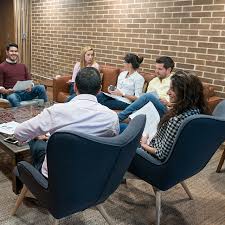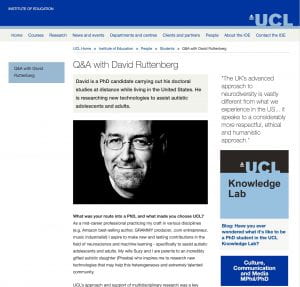 While the original intent of this blog was to catalog the first years of my PhD Distance Learning Experience, I have returned now well into my penultimate year to provide a much-needed update. If not for any other reason, I needed a break from statistical analyses and am now prepared to take stock of what’s been accomplished during the last 18 months…
While the original intent of this blog was to catalog the first years of my PhD Distance Learning Experience, I have returned now well into my penultimate year to provide a much-needed update. If not for any other reason, I needed a break from statistical analyses and am now prepared to take stock of what’s been accomplished during the last 18 months…
- A little more than a year ago, and following my MPhil/PhD Upgrade, I accepted two posts at UCL including a PGTA to the Digital Media Masters Students Programme and a Content Developer for the EdD Education Programme. Both were incredibly gratifying and I was able to contribute, particularly leveraging my previously honed at-distance skills that came in handy when helping others migrate to new ways of learning and instruction online. After all, no one knew in 2018 of the coming pandemic.
- Both PGTA and CD roles enabled me to pursue and receive Associate Fellowship in the Higher Education Academy (AFHEA, Advanced HE) from February, 2021. Since that time, I’ve been fortunate to be welcomed as a Full Fellow of the Royal Society for Arts, Manufactures and Commerce (RSA) and an Impact Fellow at UCL’s Institute of Healthcare Engineering (IHE).
- On the research front, I’ve completed the design, pilot, production and data collection for the SensorAble project. I am “well down the road” regarding data analysis and have started to author my materials, including both the Methods and Results section for both my Dissertation and Journal Articles. I’ve also presented my findings at both UCL’s Institute of Cognitive Neuroscience Development Diversity Lab and at the University of Cambridge Cognition Education and Emotion Lab.
- I am motivated to begin helping shape Public Policy by contributing on both sides of the Atlantic. This includes building upon my recent appointment as Chairperson for the Center for Autistic and Related Disabilities (CARD) at Florida Atlantic University, and in authoring forthcoming POSTNotes on invisible disabilities to Parliament. I’ll be making applications for various grants (small pots of money!) to help contribute to shining a light on neurodiversity issues relating to sensory, attention and anxiety at both HEI, employment and social venues.
- Last summer, I began shifting my focus from doctoral training to cognitive and human computer interaction (HCI) knowledge building. The latter is now begin to catch up to the former as my research was decidedly less technologically oriented in the earlier phases. I am now happily exploring Open Learner Models, artificial intelligence, machine learning, multimodal learning analytics, etc.

- As I look to publish my first journal article, I have participated in numerous conferences and continue to increase my communication and dissemination skills. Four OSF Pre-prints are now registered and available on GoogleScholar, ResearchGate, UCL Explore, and elsewhere. I even managed to complete a peer review for an article on behalf of my supervisor Sarah White, and also assisted my other supervisor Joni Holmes in editing her journal article.
There’s much more planned for the remainder of the next phase of my journey (i.e., the upcoming 18 months prior to defending my dissertation). It is my fervent hope that I will include these benchmarks in coming posts. For now…stay safe, healthy and enjoy the holidays!







